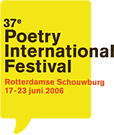Poet
|
Matthew Sweeney 1952 country: Netherlands Engels |
vindt zijn inspiratie in de rijke traditie van Ierse verhalenvertellers. Een typisch Sweeney-gedicht ontwikkelt zich – in een koele, narratieve stijl – vanuit een vertrouwde situatie, maar onderweg verandert het in een ongewoon, mysterieus verhaal zonder einde of duidelijke clue. Sweeney schrijft behalve poëzie ook jeugdpoëzie en jeugdromans. Zijn laatste bundel, Black Moon, verscheen in 2007.
In the ancient Celtic poem Sweeney Astray, Sweeney is a mad king from Ulster who believes he can fly. He usually perches in a tree, cackling forth his (un)wisdoms to the world. After many wanderings he is converted to the Christian faith by an Irish monk, but even after his conversion he retains much of his anarchist character. Here we find the history and the psyche of the Irish people summed up in a folk tale. Several Irish writers, including Seamus Heaney and Flann O’Brien, have written poems or stories about this figure of myth. Remarkably though, the Irish poet Matthew Sweeney, born in County Donegal in Ulster in 1952, kept silent for a long time about this deluded king whose name he shares. Not until 1997 did he write a poem entitled ‘Sweeney’, in which the narrator changes into a bird. This poem also characterizes his method: Matthew Sweeney distrusts purely autobiographical poetry. The Sweeney in the poem is not the poet Sweeney. The poet Sweeney cannot fly, he even has trouble boarding a plane. By his own admission, however, he resembles the mad king in having two left hands. But here the comparison ends. Sweeney prefers to make up events that could have happened, a kind of ‘alternative realism’ as he himself describes it in an interview. In his poems he may use some insignificant fact from his own life (such as the two left hands), but primarily they create a world that is not his own. Matthew Sweeney will not be reading his best-known poem at this year’s Poetry festival. He did this five years ago, when he was invited to participate for the first time. This year he will be reading only uncollected poems, due be published by Jonathan Cape as part of a new collection, Sanctuary, only early next year. Matthew Sweeney has been living in London for the past twenty years. Since his debut in 1981 he has published eight volumes of poetry, most recently A Smell of Fish (Jonathan Cape, 2000), and four children’s books (Faber & Faber). A comprehensive selection, Selected Poems (Jonathan Cape) appeared earlier this year. A selection of his poems in Dutch translation, Het ijshotel (The Ice Hotel) has recently appeared with the publishing firm Atlas. Author: Peter Nijmeijer Translated by Ko Kooman Poets: |


